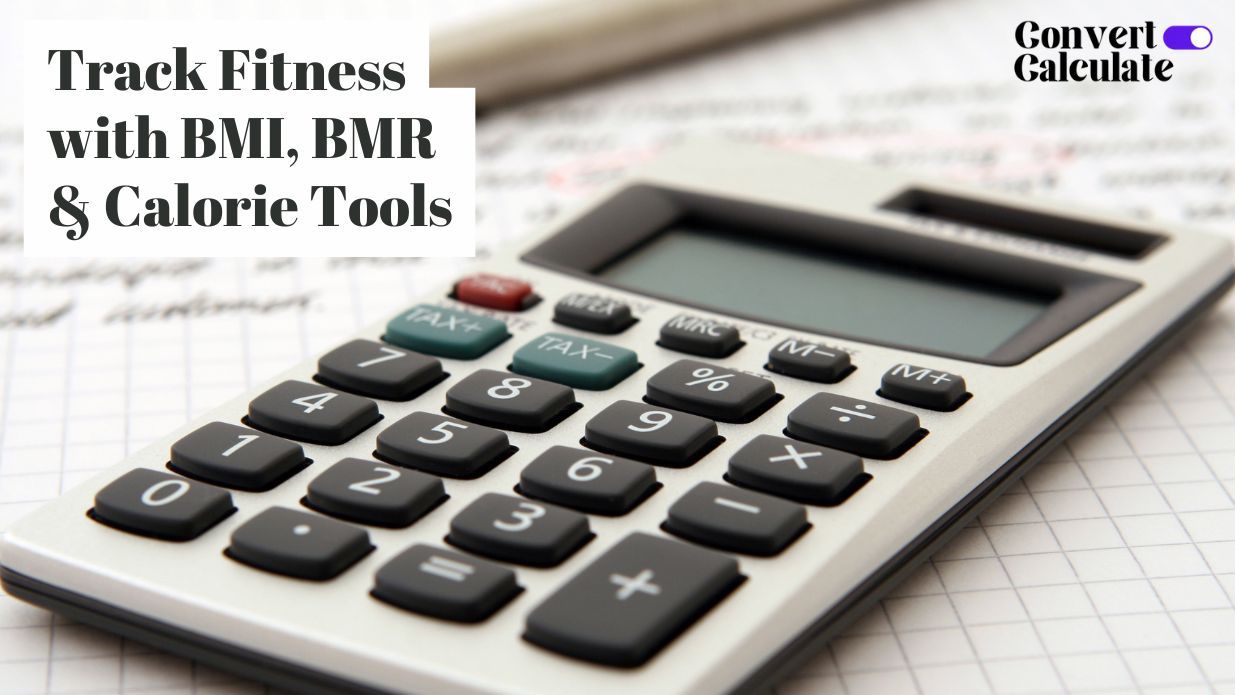Track Fitness with BMI, BMR & Calorie Tools – Your Complete Guide
Learn how to track fitness effectively using BMI, BMR, and calorie tools. Manage weight, nutrition, and workouts with personalized insights.

Maintaining a healthy and wholesome lifestyle has become increasingly essential in today’s fast-paced world. With sedentary work routines, irregular meal patterns, and rising stress levels, many people find it challenging to monitor their physical well-being. Fortunately, modern technology and scientific tools, such as BMI (Body Mass Index), BMR (Basal Metabolic Rate), and calorie tracking applications, simplify the process of managing personal health. By leveraging these tools, individuals can set realistic goals, monitor progress, and adopt strategies that enhance overall Health & Fitness . Whether you aim to manage weight, boost energy levels, or improve daily activity, integrating technology-driven insights into your routine can make achieving wellness objectives more efficient and sustainable.
Why Monitoring Your Body Matters
Understanding your body’s needs, energy expenditure, and nutritional requirements is essential for long-term fitness. These tools provide actionable insights that allow you to make informed choices about exercise, diet, and overall well-being. Whether your goal is weight loss, muscle gain, or maintaining a healthy lifestyle, tracking fitness metrics is a foundational step.
What is BMI (Body Mass Index) and Why It Matters?
BMI, or Body Mass Index , is a simple calculation that helps you understand whether your weight falls within a healthy range relative to your height. It is calculated using the formula:
BMI = Weight (kg) ÷ Height² (m²)
Standard BMI categories:
- Underweight: BMI < 18.5
- Normal weight: BMI 18.5 – 24.9
- Overweight: BMI 25 – 29.9
- Obese: BMI ≥ 30
Benefits of Tracking BMI
- Quick assessment of health risks related to weight.
- Monitors weight changes over time.
- Helps plan diet and exercise routines.
- Motivates you to stay on track with fitness goals.
Understanding BMR (Basal Metabolic Rate)
BMR indicates the amount of energy your body requires at complete rest to support vital functions such as breathing, blood circulation, and cellular maintenance. Essentially, it’s the energy your body needs to survive without any activity.
How to Calculate BMR
For Men:
BMR = 88.362 + (13.397 × weight in kg) + (4.799 × height in cm) − (5.677 × age in years)
For Women:
BMR = 447.593 + (9.247 × weight in kg) + (3.098 × height in cm) − (4.330 × age in years)
Why BMR is Important
- Determines daily calorie requirements based on activity level.
- Helps plan meals for weight loss, gain, or maintenance.
- Provides a scientific basis for exercise and nutrition planning.
- Prevents under-eating or over-eating that can affect metabolism.
Calorie Tracking Tools – How They Help
Calorie tracking tools allow you to monitor daily intake of calories, nutrients, and macronutrients. By logging meals, snacks, and drinks through apps or online calculators, you can compare energy consumption with calories burned.
Key Advantages of Calorie Tracking
- Provides personalized insights into eating habits.
- Identifies hidden sources of calories or unhealthy nutrients.
- Helps achieve specific fitness goals like fat loss or muscle gain.
- Encourages mindful eating and portion control.
Using BMI, BMR & Calorie Tools Together
To manage fitness effectively, it’s important to use all three tools in synergy:
- Start with BMI: Assess weight relative to height.
- Calculate BMR: Determine calories needed at rest.
- Track Calories: Log food intake and adjust based on activity and goals.
Tips for Maximizing Fitness Using These Tools
- Monitor progress regularly: Recalculate BMI and BMR periodically.
- Set realistic goals: Focus on gradual improvements.
- Adjust diet based on activity: Eat more on active days, less on rest days.
- Combine with exercise: Cardio, strength, and flexibility enhance results.
- Stay hydrated: Water impacts metabolism and energy levels.
- Seek professional advice: Nutritionists and trainers can provide personalized guidance.
Advanced Insights: Beyond BMI
- Body Fat Percentage: Important for athletes and health monitoring.
- Muscle Mass: Higher muscle increases BMR and improves weight control.
- Visceral Fat: Linked to metabolic health, track with smart scales or professional tools.
Nutrition and Fitness Tracking
- Macronutrients: Protein, fats, and carbs fuel the body and aid recovery.
- Micronutrients: Vitamins and minerals are vital—maintain a varied diet.
- Hydration: Proper water intake supports metabolism and overall health.
Conclusion
Tracking fitness with BMI, BMR, and Calorie Tools is essential for anyone serious about achieving health goals. These tools provide a structured, data-driven approach to nutrition and exercise planning, helping you make informed choices every day. By monitoring your body composition, energy needs, and calorie intake, you can maintain a balanced lifestyle, optimize workouts, and achieve sustainable results.
Health & Fitness Tools – Frequently Asked Questions
Can BMI alone determine my health status?
No, BMI is a general indicator. For precise health assessment, consider body fat percentage, muscle mass, and other health markers.
How often should I check my BMR?
It’s advisable to update your BMR calculation every 2–3 months or following notable changes in weight, age, or physical activity.
Are calorie tracking apps accurate?
While calorie apps provide estimates, they may vary. Using them consistently still gives useful trends for managing diet.
Do these tools work for athletes?
Yes, but athletes often require specialized nutrition plans based on high activity levels, so professional guidance is advised.